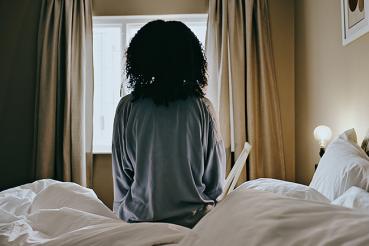If you have sleep apnea, you stop breathing frequently — for periods of 10 seconds or more — while you're asleep. This can happen hundreds of times during the night without fully waking you up, leading to extremely fragmented sleep that doesn't leave you feeling rested.
The most common kind of sleep apnea is obstructive sleep apnea, in which the tissue in the back of your throat collapses and blocks your airway during sleep. Central sleep apnea is caused by the brain failing to signal your muscles to breathe. And mixed sleep apnea is a combination of the two.
Left untreated, sleep apnea can make you sleepy during the day and can also contribute to serious health issues like obesity, high blood pressure, diabetes, depression, stroke and heart attack.
Signs You Should Get Help for Sleep Apnea
The most common sign of sleep apnea is very loud snoring. Other signs include persistent sleepiness during the day, waking up in the night feeling out of breath, and waking up in the morning with a headache or dry mouth.
How is Sleep Apnea Diagnosed?
If you have signs of sleep apnea, talk to your primary care doctor. They may refer you to a sleep specialist for a sleep study to see whether you have sleep apnea and, if you do, how severe it is. Rush offers at-home sleep studies as well as on-site sleep studies in our state-of-the-art sleep labs.
If your sleep study shows that you have obstructive sleep apnea, your sleep specialist may recommend that you have a full upper airway evaluation. This evaluation can include advanced diagnostic tests, such as a sleep endoscopy or nasal endoscopy, that will pinpoint exactly why and where your breathing is being blocked.
Rush is one of just a few in the U.S. offering DISE-PAP (drug induced sleep endoscopy during positive airway pressure application). This test can be helpful if you’ve tried CPAP (continuous positive airway pressure) and it hasn’t worked. It allows doctors to precisely assess why CPAP isn’t working — and what other treatments may work better.
Sleep Apnea Treatment at Rush
Your Rush sleep specialist will create a treatment plan that works for you, based on the kind of sleep apnea you have and on your overall health. For example, your plan might include lifestyle changes such as losing weight or quitting smoking. If you have mild sleep apnea, a custom-fit mouthpiece from a specialty dentist may help.
For moderate to severe obstructive sleep apnea, you may be prescribed a breathing device that delivers pressurized air through a mask to keep your airway open while you sleep. Options include continuous positive airway pressure (CPAP), adaptive servo-ventilation (ASV) and bilevel positive airway pressure (BiPAP) machines; your doctor will work with you to choose the one that fits your needs.
If you have obstructive sleep apnea and can't use a CPAP machine, your specialist might recommend DISE-PAP. This advanced test will assess whether you’re a candidate for sleep surgery — and which specific procedures are most likely to give you relief.
Whatever your plan, we work closely with you to monitor and adjust it as needed so you get the restful sleep you need.
Rush Excellence in Sleep Apnea Care
- Leading the field in new sleep apnea treatments: Specialists at Rush are among the first in the U.S. to offer implantable devices for sleep apnea. Inspire therapy for obstructive sleep apnea stimulates key airway muscles; Rush is one of just a few centers worldwide using microscopic techniques to achieve the most precise implantation of the device.
- Comprehensive, coordinated care: Our Sleep Disorders Service and Research Center was the first such center in Illinois and the first in the region to be accredited by the American Academy of Sleep Medicine. Rush experts in pulmonary medicine and sleep surgery work together in the center to diagnose sleep apnea and develop a plan for helping you sleep soundly again.
- Expert equipment support: If you're prescribed a CPAP, ASV or BiPAP machine, our team can help you get used to sleeping with it in place, and can help make sure that your mask fits properly.
- Groundbreaking research: Rush researchers have made breakthroughs in treating sleep apnea, including developing some of the first oral appliances that treat the condition and identifying sleep positions that help lessen the effects of obstructive sleep apnea.
- Access and convenience: You can see a sleep specialist on-site or via telehealth, and you can do a sleep study at home or in a state-of-the-art Rush sleep lab that's convenient for you.
- Expertise in stroke prevention: Sleep apnea can increase your risk of having a stroke. The Rush Stroke Prevention Clinic team can work with you on a prevention plan. Our experts tailor a prevention plan just for you, including ways to manage your risk factors.
- The most precise diagnostic tests: We’re one of just a few hospitals in the U.S. to offer DISE-PAP (drug induced sleep endoscopy during positive airway pressure application). If you’ve tried CPAP and it hasn’t worked, this test can help determine why — and whether a surgical procedure may offer more relief.


